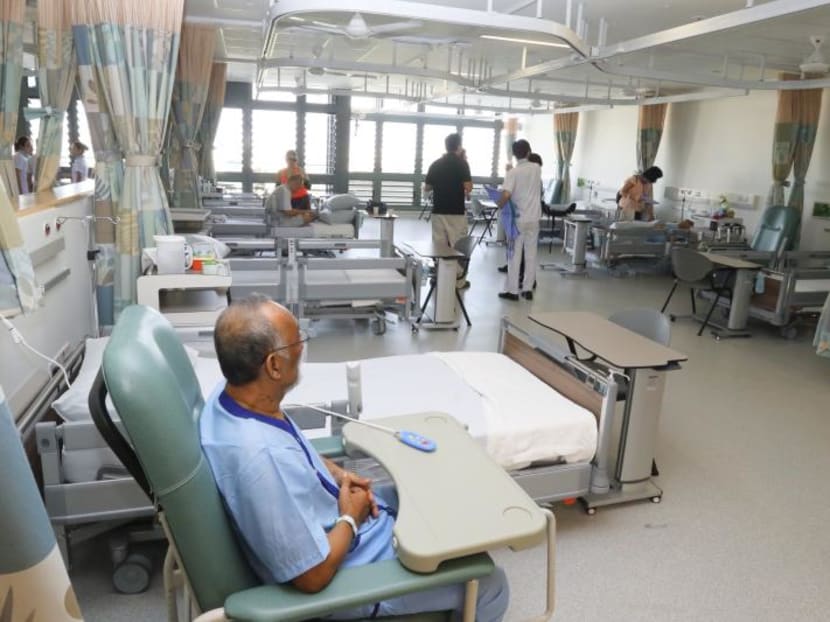Too early to say if those with IP full riders now will have to co-pay hospital bills: Insurers
SINGAPORE — More than 1.1 million Singapore residents whose Integrated Shield plans (IPs) with riders now fully pay for their hospital bills will not be affected – for now – by the Government’s requirement for new riders to feature at least 5 per cent co-payment.

More than 1.1 million Singapore residents whose Integrated Shield plans (IPs) with riders now fully pay for their hospital bills will not be affected, for now. TODAY file photo
SINGAPORE — More than 1.1 million Singapore residents whose Integrated Shield plans (IPs) with riders now fully pay for their hospital bills will not be affected – for now – by the Government’s requirement for new riders to feature at least 5 per cent co-payment.
All six IP insurers confirmed this, in response to media queries.
AIA Singapore, AXA and Prudential said they would continue to monitor claim trends and explore new ways of managing claims to ensure sustainability. Prudential introduced a claims-based pricing system last May that charges premiums according to the size of claims, for instance.
The insurers said it was “too premature” to say if the situation would change, but the Life Insurance Association said IP insurers will “thoroughly evaluate the new products, and decide if they will transit existing policyholders”, taking into how various measures help mitigate rising healthcare and health insurance costs.
Some analysts felt it was a matter of time before some policyholders transit to co-payment riders that would require them to pay at least 5 per cent of hospital bills out-of-pocket.
The Government’s announcement was made on Wednesday (March 7) in Parliament by Senior Minister of State for Health Chee Hong Tat, who said new IP riders will be available within a year. Insurers can continue selling existing rider plans but must inform new policyholders that they will transit to the new riders with co-payment from April 1, 2021, unless they wish to do so earlier.
Health management expert Jeremy Lim expects insurers to offer a co-payment plan with lower premiums to existing policyholders with riders.
As more switch, premiums for existing rider plans could become unsustainable for the remaining policyholders, he said.
“The insurers may also offer to give them back a certain amount if they convert (to a co-payment plan). Policyholders who don’t have large bill sizes are likely to switch, leaving a smaller pool of patients with very poor risk on full rider plans,” said Dr Lim, who leads the health and life sciences practice in Asia at global consultancy Oliver Wyman.
“As a result, premiums for those plans will escalate and may become increasingly unaffordable,” he said.
Health government parliamentary committee chairman Chia Shi-Lu agreed that there may a “gradual convergence” towards co-payment plans.
“I think that the concern of all insurers is that with the current claims trend, the full rider policies will become unsustainable in the future,” said Dr Chia.
Gastroenterologist Desmond Wai felt existing IP rider policyholders are likely to keep their current policies, as many bought the riders for peace of mind.
“Those who are more elderly, have medical comorbidity, or are having more serious problems are likely to keep their current policy and riders till April 2021. Though they may be paying a higher premium, they know they will fall sick and so want maximum protection,” said Dr Wai. “But the younger and healthy ones are likely to switch to the new riders that charge a lower premium.”
WHAT CAUSES COSTS TO SPIRAL
Doctors and consumers said they have encountered or heard of unnecessary tests or treatment being rendered, as a result of insurers footing the entire hospital bill.
An AIA full-rider policyholder, who only wanted to be known as Ms Xie, felt the MRI and CT scans ordered, after she suffered bruises from a car accident two years ago, were warranted.
But she was also advised to see an orthopaedic surgeon, do a general health screening and have a session to check for psychological trauma. Each session cost about S$100.
Ms Xie, 27, did not question the doctors’ advice at the time “because they are healthcare professionals”. But on hindsight, the sessions may have been unnecessary, she said.
A doctor who declined to be named said he has observed a case involving drainage of pus from a patient’s limb being billed three to four times what it would usually cost.
Full-rider policyholders may adopt a “safe than sorry” mindset and demand in-depth tests even for minor ailments, said infectious diseases specialist Leong Hoe Nam. Such investigations often lead to higher bills and overconsumption of services, he said.
The co-payment percentage of at least 5 per cent would make patients think twice about healthcare spending, said the doctors.
“Currently, people with full riders are in the minority but are spending the majority’s money, hence it is not very fair,” said Dr Chia.
To better manage healthcare costs, some IP insurers have also agreed to put in place a pre-authorisation framework and panel of preferred healthcare providers offering cost-effective services, said the Life Insurance Association. This was among measures put forward by an industry-led Health Insurance Task Force in 2016.
The framework, which will require policyholders to obtain approval for their chosen procedure, will “guard against unnecessary treatments, any unexpected out-of-pocket payments, and possible denial of claim”, said the association’s spokesperson.









